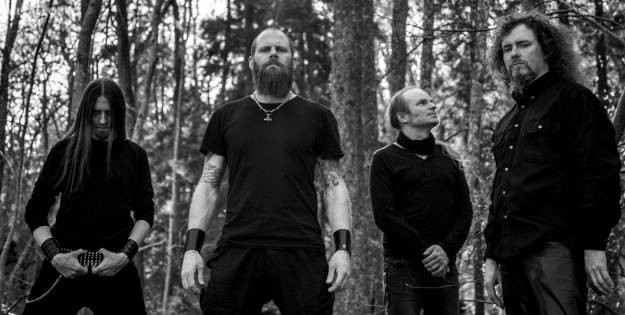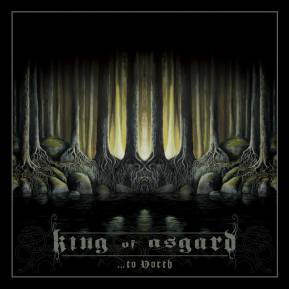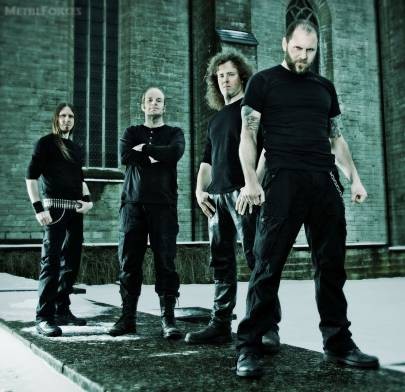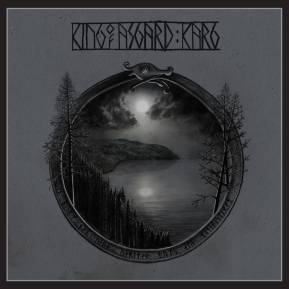
KING OF ASGARD – The Heritage Throne
Anthony Morgan
July 2014
 King Of Asgard (l-r): Jonas Albrektsson, Karl Beckmann, Lars Tängmark and Karsten Larsson |
![]()
Mjölby, Sweden-based melodic death metal outfit King Of Asgard formed in 2008, King Of Asgard initially being a duo consisting of erstwhile Mithotyn members Karl Beckmann and Karsten Larsson. A seven-track affair, inaugural demo Prince Of Märings was cut in January 2009 at Lotang studio. In November of that year, bassist Jonas Albrektsson (ex-Thy Primordial) joined the group’s ranks.
“Karl and I have been friends since we were five years old, so we’ve hung together for about 33 years (laughs), but had never played in a serious band together,” Jonas notes. “He and Karsten formed King Of Asgard as a two-man project. Actually, since day one he was asking me to join, but I was like ‘Nah, it’s not my thing.’ I’m more into black metal, death metal, and stuff, and the demo was maybe too melodic and not really my cup of tea. Anyway though, I went there and tried some rehearsals together just for fun. I realised I liked it anyway, and working with Karl is also a pleasure for me. You know of the long friendship, and we really work good together and don’t have to play around. We know each other so well. It works perfect, and now when we work so close together, we get both opinions – I’m satisfied, and he’s satisfied. I guess King Of Asgard would’ve taken another turn if I hadn’t had joined, but I think it was cool. By the results of the albums and stuff, it’s something good at least (laughs).”
On March 10th, 2010, it was revealed that King Of Asgard had inked an album contract with Metal Blade Records. “I joined maybe when they had just signed, so I was on the contract from the beginning,” the four-stringer recalls. “I think they were in contact with Metal Blade at the moment when I joined, and from thereon we went.”
Debut offering Fi’mbulvintr arrived in August of that year. “It was quite interesting,” Jonas enthuses. “We didn’t really know what to expect. Of course we knew the songs, but it was the first record, and it really took shape after recording. We didn’t expect it to be as good as it came to be, so we were quite happy with the result by it being as good as it was. Yeah, it was good times. We had fun, and it was very nice to get all the good words on it afterwards. It got really well received, so it’s all good memories and a very good start for our band, I guess.”
Fi’mbulvintr was the first of three King Of Asgard full-length studio efforts – to date – to be recorded with King Diamond guitarist Andy LaRocque at Sonic Train Studios in Varberg, Sweden. “It was actually back in the Mithotyn days,” the rhythmist cites with respect to Andy’s initial involvement. “They recorded three albums at Andy’s studio but then it was called Los Angered Recordings, so they knew Andy already – Karl and Karsten. Also, Falconer had been recording there as well. The guys had known Andy for many years, so we just tried it. We called other studios as well and checked prices and shit, and it was worth both the money and we knew what we would get. That’s why we hooked up with Andy.
“Sonic Train is a fully equipped studio with everything you need. I’m not very good at technical stuff, but it has a big board, ProTools – every effect and stuff that you could ask for, and also a lot of guitar amplifiers. It’s two studio rooms; one bigger recording room, and one smaller one. We can record vocals and stuff in the smaller room at the same time as maybe someone playing guitar. Also, we’ve lived there (laughs). It’s like 24/7 for two weeks. Yeah, it’s a fully equipped studio with everything you could ask for, and also a bed, kitchen and toilet, and whatever you want (laughs).”
King Of Asgard’s musical stylings touch upon several metal subgenres. “I would say we’re a very straightforward classic black / death metal band, really,” Jonas describes. “Powerful metal music with aggression and seriousness, I would say. I think we’re musically influenced by early death metal and black metal periods, like Swedish death metal – Entombed, Dismember, Unleashed, and that stuff – as well as the more Norwegian black metal like Satyricon and the more folk’ish stuff like Isengard, Norse folk music and stuff.
“There’s Bathory of course, and also an artist called Jan Johansson who is a jazz pianist from Sweden. He kind of captures Swedish melancholy, as they say (laughs). That is something we also kind of hook up on, and want to bring into King Of Asgard – the melancholic side of music. It’s a blend of all the stuff that we’ve actually listened to ourselves through the years, and what we appreciate the most is our influence, from classic metal to death metal and black metal, and so on. That’s what we are (laughs).”

|
The addition of guitarist Lars Tängmark was confirmed on September 5th, 2010. “We looked for a guitarist for quite a while,” the bassist remembers. “We asked all of our connections, but no-one was really available – they were all in other bands, and stuff. Then we came across Lars, who was a longtime friend as well. He played together with Karsten in Dawn and some other projects, so he’s a longterm member of the scene as well here in Sweden – he’s been playing black metal and death metal for many years. We asked him, and he wanted to join. That’s how it went. He started just after the release of Fi’mbulvintr, so he’s been along almost as long as I have. The main reason for taking him in – or at least another guitarist – is to be able to perform live, and get the songs out as they are on the record really.”
July 2012 sophomore outing … To North was the first to feature the axeman. “That was after should I say the success of Fi’mbulvintr,” Jonas chuckles. “Not really success, but yeah, it was a good start. Then we came to the studio to record … To North and the songs on that album, which we were really proud of. We felt this was something we looked forward to recording. It was a blast and we had a good time that time as well, and we’re really proud of how it came out. Many good songs on that record, I guess. Basically, all of our recording sessions work the same. We’re well-prepared; everything is finished before we enter the studio, so we merely go into the studio and record it (laughs). It’s already done, but yeah, we’re proud of … North as well. It’s a good record.”
July 2014 affair Karg is King Of Asgard’s third overall. “Writing started like a year before we went into the studio,” the four-stringer reveals. “We put our stuff together, and started making the new album. We started without a guideline, just jamming the songs together. Maybe the first song we wrote made the rest of the record, kind of, in terms of what way we should go. We also found a title for the record, which is Karg, a Swedish name. It translates to ‘barren’ in English. We just thought that it fit somehow with the material that we had written thus far.
“It kind of expressed the feelings that we wanted with the music, I would say, and we also think that it’s a nice word. It’s a cool album title and yeah, it fit the overall concept with the art and everything, really. We used that word as a guideline for the music, sort of. We wanted this record to be harsher and stripped down, more direct, and a darker album than the other ones. So yeah, it was planned all the way maybe, but not from the very beginning.
“We have a rehearsal space, and we rehearse once a week – sometimes more before recording, or before live sessions and stuff. Me and Karl Beckmann the vocalist, we write all of the music together. We rehearse at home, me and him, and put the songs together and record them. We’re quite effective that way. We rehearse and work at home together as well. That’s how it goes. We worked very hard for a year with the material, making pre-production with vocals and everything. We went into Sonic Train Studios when we were finished, and recorded for two weeks, almost three. That was how it went.”
Karg’s darker nature than the group’s previous two platters might be the result of something specific. “I think it’s because of the melodies – they’re not on top of the music,” Jonas submits. “We put more guitars on top of there – rhythm guitars – on the other two albums. The melodies are in the riffs on this one because we put the melodies in the rhythm guitars, so it’s more direct, and it is also… How should I explain it? It’s just core, pure power. It’s just simple rock ’n’ roll attitude, really. There’s a lot of expression in the songs, I guess.”
For those aforementioned reasons, Karg is arguably a better representation of King Of Asgard as a live entity. “I think it is, because we can really perform it in the way that you can hear it on the record,” the rhythmist tenders. “I guess it’s more personal. Everything is written straight from us – we don’t try to write a hit song or whatever to please others. This is what we like; we do it, and our fans and followers like it as well. I guess the new material will be more powerful when we play them live as well, more true in a way.”
Should Karg be “more personal”, this perhaps suggests predecessors Fi’mbulvintr and … To North were less personal. “They are personal, but I guess it takes quite a while to find the essence of the band,” Jonas muses. “The first album was more about finding a sound and what we wanted to do, and the second album was about shaping the band a bit more. Now I guess we are at a level where we found ourselves, and we are safe with what we do. It’s kind of a personal sound these days; whereas the other two albums are more reminiscent of other bands and our influences, this is more personal.”
The man’s bass work, meanwhile, “beats around the riffs. Me and Karl write the music together, so we sit down at home and write all of the parts. He creates the guitar parts and I follow on the bass, and create whatever the bass lines are to fit in the best way possible. I think the bass is mainly in the background – it’s not as present as it is in much other metal music. It’s more there in the background, pushing everything forward I guess.”

|
The majority of King Of Asgard’s lyrical content is authored by Jonas. “I think it’s like 60%, maybe,” he estimates. “Then comes Lars the second guitarist, who did the rest for this album. Karl wrote one lyric in co-operation with me maybe, so Karl isn’t involved very much in the lyrics but more in the music side of it.
“It differs quite much from the other albums that we’ve done, which were more about telling the Norse mythological stories and such. These days on Karg, we’re more getting down to our history that’s near or close by, or should I say our ancestral past. We live in a rich, historic ground with rune stones and history around the corner, so we kind of try to get that more into King Of Asgard as well as regular or should I say Norse mythology – retelling stories and stuff, which is our basic foundation maybe. Some of the songs are about stuff that is close to where we live and so forth though, so it differs quite some from the other records I guess.
“‘Remnant Of The Past’ is a tribute song where we’re praising a rune stone for example, which is close to where we live and not far from our rehearsal space. It’s very present; it’s one of the oldest runes in Sweden and even northern Europe, I guess. It was erected in the 800s, I think. It has the longest inscription for that time period. A lot of mysteries surround it, because no-one has ever been able to read the stone perfectly or whatever else. They can’t read all of the runes, because there’s some sort of mystic thing about them. Yeah, we celebrate the stone actually. Also, we want to show that history is strong and stands no matter what, really. Christianity put it away and stuff, but still it’s standing there. ‘Omma’ is a story about a queen of mist on the mountain near where we live, and it’s like a fairytale, really. The mountain is called Omberg, which is also some relation to Norse mythology. So yeah, they’re the clearest examples I guess.”
‘The Runes Of Hel’ happens to be Karg’s lead composition. “That’s a story taken from Norse mythology, the region called Hel which is comparable to Hell maybe,” the four-stringer informs. “It’s pretty similar to that, but yeah, it’s the realm of the dead – where the dead end up. The warriors go to better places, but the thieves and people that die a normal death end up in Hel. It’s not the best place to be (laughs). It’s the lowest world in the tree (Yggdrasil), in the bottom roots.
“We recorded a video for ‘The Runes Of Hel’ in June, and it was finished three days ago I think. It’s gonna be released within a couple of weeks, I guess. It’s not official yet I guess, but that’s how it goes. It was recorded with Rickard, our good old friend and video / photo session maker. It’s the same concept as on the other albums – he did photos for the record, and also the video. We recorded it in the city where me and Karl was born, called Vadstena. Yeah, it’s in a castle from the 14th century I guess. We played just like on the other videos, but inside one of the circular turrets – where they have cannons and shit (laughs). So yeah, it’s gonna be cool I hope. I haven’t seen it yet, but I will in the next couple of days.”
Recording sessions began in March 2014 at Sonic Train Studios, Andy LaRocque spearheading production yet again. “We’ve done all of our records in Sonic Train together with Andy LaRocque, and this time also with a guy called Olof Berggren,” Jonas shares. “We were there for two weeks, and then some more days for mixing and mastering and stuff. It went good. We worked as we usually do. We’re getting to know Andy very well – we’re like friends getting together. It’s become a really professional way to work. He helps us realise our visions, so to speak. It was good to get back there. We know what we get, and he can help us with it. He also likes to work with King Of Asgard, so that’s a perfect combination.”
The rhythmist views King Of Asgard’s relationship with Andy as being quite friendly. “He really enjoys working with us, I think,” he feels. “He thinks it’s nice when we come back. We talk to him during the year or years when we’re not there, so we’ve become friends. He wants us to come back. He likes to work with us; we get along very good, maybe because we know him. He likes it, and he likes our progression as well, our songs. He’s really into power in music; he likes to help us bring that forth, and yeah, he likes our music. I remember when he heard ‘The Runes Of Hel’. After we recorded that one he was like ’Oh fuck, this is some shit’ (laughs), so that’s cool to hear from a legend like him.”
Andy’s role is motivational in nature. “He brings out the best of us; he pushes us, kind of forces us to do our very best (laughs) – like ‘Come on, you can do it better,’” Jonas compliments. “If we tell him our ambition for the next King Of Asgard album, that we want it this way or that way, he’s like ‘Okay, I think I know how to fix it.’ So yeah, he kind of fixes our intentions with King Of Asgard. He doesn’t produce much on the songs, except maybe some stuff like adding something or taking away something that is too much. But yeah, the structures are already made, and they stay the way they are. Yeah though, he helps us a lot.”

|
Olof Berggren worked in co-ordination with Andy. “Sometimes we worked in both studios, recording drums and maybe bass in the other studio, as well as vocals in the evening when Andy was off,” the bassist divulges. “Olof worked in the small studio, and he also helped Andy out with mastering. When they worked together, it was cool. Olof recorded all of the vocals this time, and that was interesting. He’s been a lot of good at helping, as well. Also, the piano intro was recorded by him – all the sounds and stuff for the song ‘Omma’. So yeah, he did a lot as well.”
A cover interpretation of Bathory number ‘Total Destruction’ is included as a bonus cut on Karg. “Bathory is Bathory, and we’ve all hailed Bathory in King Of Asgard since childhood really,” Jonas tells. “We did a cover song on the previous record by Isengard, called ‘Vinterskugge’ (from the March 1994 album of the same). We thought we should take that away, mainly for live reasons. We picked that Bathory song called ‘Total Destruction’, and rehearsed it for a while. ‘Why not record it as well?,’ we thought, because Bathory is one of the greatest influences for King Of Asgard – both for the band, and for us as persons.
“The song is taken from The Return… (May 1985), which we all agreed is the one that has made the most impact on us – a personal impact, maybe. That’s why it’s a tribute to Bathory, really. Lars the guitarist once told me that when he heard The Return…, he was 14 years old, and that it was like ‘Okay, this is how you do it.’ After hearing that record, he started making his own music, and was influenced by such. It means a lot, and yeah. I hope people like it as well. It’s not close to the real stuff, but anyway (laughs).”
The four-stringer joined Vanhelgd during June 2013, lending bass parts to May 2014 outing Relics Of Sulphur Salvation. “Vanhelgd is an old school Swedish, dirty death metal project or band.” he determines. “They’re close friends to me. They’ve been struggling with bass guitarists, or at least they wanted to go further. He was out (Viktor Gustafsson), and I came in. I enjoy playing that kind of music very much; brutal and straightforward, and very much with attitude and seriousness. They’re cool guys and I really like playing with them as well, so I’m busy right now with everything.”
To date, Jonas isn’t extensively involved with respect to writing compositions for Vanhelgd. “I just started when they started to write the new album, Relics Of Sulphur Salvation,” he discloses. “Of course I was involved in the rehearsal place, making some additions to the riffs they had – maybe the structures, and so forth. So yeah, I’m involved in the songwriting one could say, but not as much as in King Of Asgard – not at all. Maybe in the future, but King Of Asgard takes my time, so I leave it to them and maybe just help them out. I work together with them in the rehearsal room. It’s cool. We’ll see about the future, how it will be. I will probably be more involved in the future. As I said, I started just before the intense period of rehearsing the new record.”
Karg was released on July 18th, 2014 in Germany, Austria, and Switzerland, on the 21st in the rest of Europe, and subsequently on the 22nd in North America, all via Metal Blade Records.
Interview published in July 2014.
Related Posts via Categories
- SCOTTISH SICKNESS – A Report On The Scottish Death Metal Scene, Featuring BRAINBATH, PUTRID FATE And RANCID CADAVER (October 2022) | Features / Interviews @ Metal Forces
- LARVAE – Join The Hardcore Cult! (June 2022) | Features / Interviews @ Metal Forces Magazine
- TRENCH FOOT – Sacrificing Morals For Gory Obscenities (June 2022) | Features / Interviews @ Metal Forces Magazine
- L.A. GUNS – Trigger Happy (March 2019) | Features / Interviews @ Metal Forces Magazine
- CANCER – Crimes So Evil (November 2018) | Features / Interviews @ Metal Forces Magazine
- U.D.O. – The Tank Drives On (August 2018) | Features / Interviews @ Metal Forces Magazine
- SIEGE OF POWER – Bleeding For The Cause (August 2018) | Features / Interviews @ Metal Forces Magazine
- MOONSPELL – A Taste Of Live Eternity (August 2018) | Features / Interviews @ Metal Forces Magazine
- MONSTROSITY – Dark Matter Invocation (August 2018) | Features / Interviews @ Metal Forces Magazine
- SATAN – Five Magicians (August 2018) | Features / Interviews @ Metal Forces Magazine
|
|





